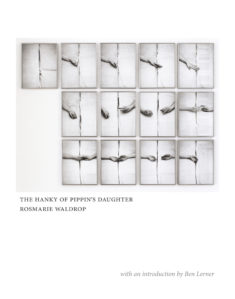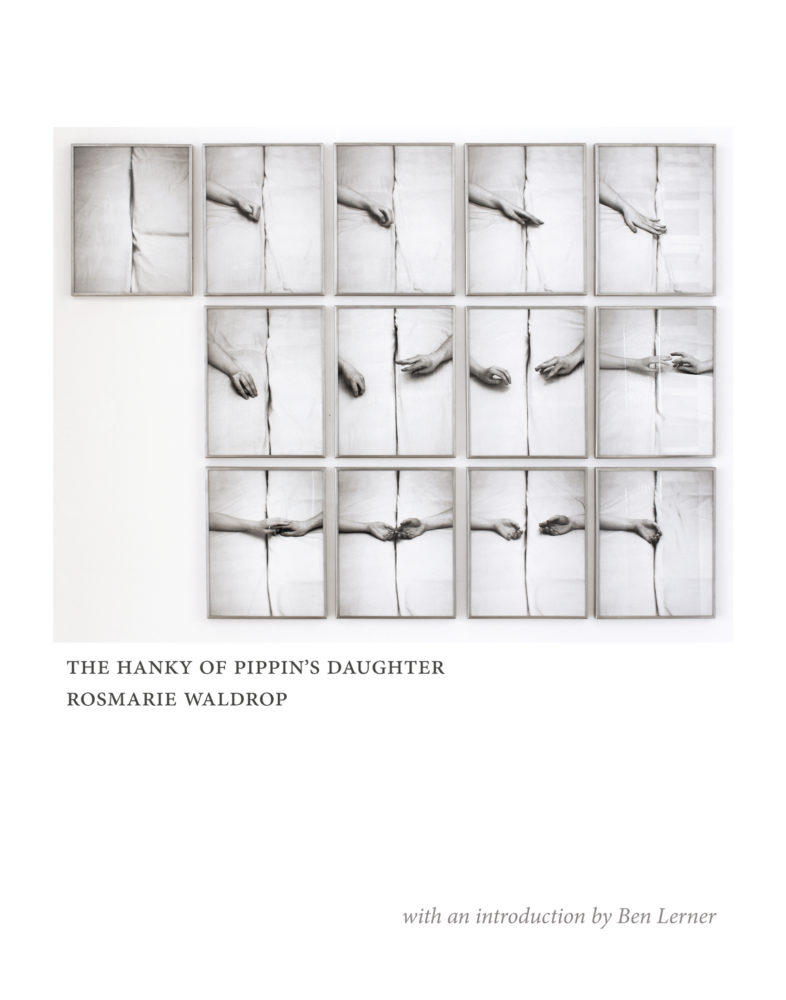
buy this book from our distributor NYRB
Poet, translator, and editor Rosmarie Waldrop has been a forceful presence in American and international poetry for over forty years. Born in Germany in 1935, Waldrop studied literature and musicology at the University of Würzburg and the University of Freiburg before immigrating to the United States in the late 1950s. She received a PhD from the University of Michigan in 1966. While at the University of Michigan, Waldrop married poet and translator Keith Waldrop. In 1961 the Waldrop’s began Burning Deck Magazine. The magazine evolved into Burning Deck Press, one of the most influential publishers for innovative poetry in the United States. She has lived in Providence, Rhode Island since 1968 and has taught at Wesleyan, Tufts, and Brown. Her most recent book of poetry is Gap Gardening: Selected Poems.
Ben Lerner has received fellowships from the Fulbright, Guggenheim, and MacArthur Foundations, among other honors. He recently edited Keeping / the window open, a volume of Keith and Rosmarie Waldrop’s writing, published by Wave Books.
The Hanky of Pippin's Daughter

buy this book from our distributor NYRB
“Rosmarie Waldrop’s haunting novel, superbly intelligent, evocative and strange, reverberates in the memory for a long time, a song for the dead, a judgment.” —Angela Carter
Introduction by Ben Lerner
For news and events, please follow us on Instagram or sign up for our newsletter.
Read Ben Lerner’s Introduction to the book at The New Yorker.
*
“Wonderfully, relentlessly absorbing, Hanky’s several overlapping tales leave one marveling at the beauty, economy, and humor with which Waldrop interweaves the complex tensions of Hitler’s Germany in a family drama of repeated infidelity. Delightfully rich and bawdy and as strong-willed as its characters.” —Lydia Davis
“[T]he whole novel forms a poetic sequence from which a discourse about origins—psychological, legendary and historic—unfolds. . . Readers will find in this ambitious, at times brilliant fiction a passionate articulation of a painful and guilt-ridden memory.” —The New York Times
“This lyrical first novel continues the experimentalism that has been Waldrop’s trademark . . . a stunning work.” —Library Journal
“Honestly, the novel is a joy to read, the kind of reading where you’re almost smiling? I really think there’s nothing like it. In this reissue, Dorothy – in the book’s 5.5 x 7 in. shape, clean white cover with a Rudolf Bonvie series of repeating, slightly changing photographs of hands reaching across a divide, like Lucy’s looping narrative, a layered history of human interaction – brings the pleasure of Waldrop’s physical prose to the book form itself, making a lovely, lovely object.” —Kelly Krumrie, Full Stop
“Hanky is lush, lyric, and darkly funny. It’s an iconic addition to the Dorothy family.” —Nate McNamara, Literary Hub
“The Hanky Of Pippin’s Daughter was largely written off as ‘a poet’s novel’ at the time of its original publication in 1986, and it fell into relative obscurity until its October 2019 re-release by Dorothy, a publishing project. I must confess, as a poet who writes fiction, I immediately felt defensive at such a dismissal. But I can happily say this book does not need anyone to defend it. It is a thing that glistens and refracts, ultimately unraveling many imbricated stories, slowly at first and then all at once.” —Elizabeth Kolenda, New Delta Review
“Rosmarie Waldrop is best known for her wonderful poetry and translations. Now she should be known for her prose fiction, The Hanky of Pippin’s Daughter is an extraordinary book.” —Dallas Wiebe, Small Press Review
“Waldrop’s gratifyingly complex novel . . . powerfully models the desire, and the moral responsibility, to know one’s history.” —Publishers Weekly
“In probing longings, dissatisfactions, betrayals in the life of a German family, it is Germany itself—its ambivalence in regard to its unresolved past—that is being examined in Rosmarie Waldrop’s supremely intelligent novel. The Hanky of Pippin’s Daughter is a remarkable achievement.” —Walter Abish
“A work of fiction written unmistakably by a poet . . . a novel rare for its evocation of the early experience of its protagonist, who grows up in the Germany of Hitler’s era, and of the unique womanhood she eventually creates for herself after the Second World War and far beyond her native Germany. The resonance of even the title of Rosmarie Waldrop’s first venture into fiction—The Hanky of Pippin’s Daughter—suggests the qualities of this novel.” —John Hawkes
“A short, electric first novel. . . .Waldrop’s prose is unsettling and evocative, like the events she explores. . . . She makes dazzling use of repeated actions; the same dreams, the same gestures, the same places return again and again, but so fine and powerful is Waldrop’s use of the device that the stings of betrayal grow deeper, the tiny actions more and more profound. . . It is not the least of Waldrop’s talents that she is very, very funny, and she sharpens her black humor to a knifelike edge that makes the punchlines hurt . . . the novel is stunning, an incisive portrayal of the proposition that the history of lies is the vital task of history itself.” —Stacey D’Erasmo, The Village Voice
“Josef and Frederika Seifert made a bad marriage—he so metaphysical, she, furious frustrated singer, furious frustrated femme fatale, unfaithful within two months of the wedding day. The setting is small town Germany between the wars; the Seiferts are just those ‘ordinary people’ who helped Hitler rise, bequeathing their daughter, who tells their story, a legacy of grief and guilt. Rosmarie Waldrop’s haunting novel, superbly intelligent, evocative and strange, reverberates in the memory for a long time, a song for the dead, a judgment.” —Angela Carter
“Broken into sections with titles like ‘Portrait of Frederika as a Control Tower,’ Waldrop’s examination of a private domestic war inside a world war might be considered in relation to Gertrude Stein’s Lifting Belly, the celebration of an erotic love life inside the same world war.” —Forrest Gander, “7 Great Novels Written by Poets,” Lit Hub
“This novel is worth the considerable effort it requires. . . . Waldrop writes in a rich, intelligent style full of musical imagery. The rhythms of language are honored here.” —Providence Sunday Journal
“This lyrical first novel continues the experimentalism that has been Waldrop’s trademark both as poet and as publisher of Burning Deck Press. Constituting a woman’s letters to her sister, it narrates the attempt of both to come to terms with their marriages and affairs between marriages. . . . The narrative is fragmented, which can make it difficult both to tell a complete story and to create characters with whom readers identify. Waldrop successfully avoids these pitfalls, producing a stunning work.” —Soho Weekly News
“A re-issue of the 1986 epistolary novel, The Hanky of Pippin’s Daughter is a reminder that Rosmarie Waldrop is a master of prose fiction and poetry.” —Electric Literature
Poet, translator, and editor Rosmarie Waldrop has been a forceful presence in American and international poetry for over forty years. Born in Germany in 1935, Waldrop studied literature and musicology at the University of Würzburg and the University of Freiburg before immigrating to the United States in the late 1950s. She received a PhD from the University of Michigan in 1966. While at the University of Michigan, Waldrop married poet and translator Keith Waldrop. In 1961 the Waldrop’s began Burning Deck Magazine. The magazine evolved into Burning Deck Press, one of the most influential publishers for innovative poetry in the United States. She has lived in Providence, Rhode Island since 1968 and has taught at Wesleyan, Tufts, and Brown. Her most recent book of poetry is Gap Gardening: Selected Poems.
Ben Lerner has received fellowships from the Fulbright, Guggenheim, and MacArthur Foundations, among other honors. He recently edited Keeping / the window open, a volume of Keith and Rosmarie Waldrop’s writing, published by Wave Books.
Art on cover copyright © Rudolf Bonvie
Dialog, 1973
Sequence photography
Used by kind permission of the artist
Regarded as one of Germany’s earliest media artists, Rudolf Bonvie is best known for his digital assemblages of film stills, media images, and fashion photographs, placed alongside his own photographs. While largely focused on the various ways images are used to both inform and manipulate the public, more recently Bonvie has turned his attention directly to the internet. He creates what he calls “tumblrworks”—a combination of his own images and those culled from the social media website, Tumblr (see his own Tumblr here).

